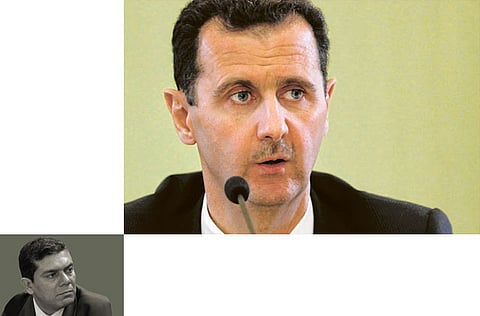Why Al Assad could still prevail
The West’s unwillingness to arm the rebels and divisions within SNC are a worry

Recent events in Egypt have overshadowed the bitter conflict in Syria which has been raging on for more than two years. In fact, the overthrow of Islamist president Mohammad Mursi is seen as an important victory for the beleaguered Syrian leader Bashar Al Assad as his forces move on to dislodge the rebels from the important city of Homs in central Syria.
Under Mursi, Egypt had become an important player in the anti-Al Assad camp, hosting meetings by the opposition and embracing calls by Sunni clerics to join the jihad in Syria against the regime, Hezbollah and Iran. Two weeks before he was deposed by the military, Mursi cut off diplomatic relations with Damascus and encouraged Egyptians to go to Syria to fight. Few believed Al Assad would outlast Mursi, who was to rule for three more years as Egypt’s elected leader.
In fact, things have been going Al Assad’s way for the past few months now. After two years of fierce battles during which the rebels were able to take over much of the north, including Idlib, parts of the strategic city of Aleppo, most of Homs, chunks of the Damascus countryside and large areas of the southern district of Daraa in addition to military bases and airports, the regular army was able to turn things around two months ago and launch a massive counterattack to reclaim lost territory.
No one in the Free Syrian Army (FSA) is talking about the final onslaught on Damascus anymore. In fact political and military leaders have been pleading with the West and Arab allies to send sophisticated weapons to help them repulse the regular army which has been joined by elite fighters from Hezbollah.
The turning point was the fall last June of the strategic town of Qusayr, between Homs and the Syrian-Lebanese borders. Despite the hype about the crossing of Hezbollah fighters to help liberate the town, the rebels and their foreign backers were unable to stem the tide. The town fell after a short siege. Qusayr opened the way to Homs, itself an important prize because of its central location and size.
And surely the regular army, backed by air force and heavy ground artillery began moving towards Homs earlier this month. Once more the rebels found themselves under siege and unless key reinforcements arrive soon, the city could fall within days.
Such victory will certainly embolden Al Assad’s position both inside and outside Syria. His forces could soon be on their way to liberate Aleppo, the country’s economic capital. It would leave the rebels cut off from the rest of the country and they would be forced to withdraw towards the Turkish borders.
This reversal of fortune for the rebels can be traced to three main reasons. First is the inability or unwillingness by the major western countries to provide weapons to rebel groups for fear that they would fall into the hands of jihadists. Despite all the talk about maintaining the balance of power on the ground, the West has failed to deliver on promises to send sophisticated arms to the FSA. Second is the failure of the Syrian National Coalition (SNC) to present a united front. The SNC suffers from divisions, internal competition between religious and secular groups and conflicting loyalties to patron countries like Qatar and Saudi Arabia.
After the resignation of Muath Al Khatib it took the opposition months to elect a successor. Ahmad Al Jarba’s close ties to Saudi Arabia will pivot the coalition towards Riyadh at the expense of Doha. And third is the fact that the anti-Al Assad camp is less united and not as committed as his supporters.
Russia has played the Syria card smartly as it confronted US efforts to depose Al Assad. It has derailed attempts to involve the UN and repeat the Libyan scenario. Washington’s policy on Syria can be described as confused and confusing at best. It has shifted from a hardline position to one that favours a political settlement which does not meet any of the opposition’s key demands.
And even when Washington and Moscow agreed on a formula to kickstart a political process under a second Geneva Convention, the anti-Al Assad camp failed to adopt the concept as a genuine path towards ending the conflict. During this period, Al Assad remained steadfast and refused to bow under pressure. On his side were Iran, Iraq and Hezbollah, representing a Shiite axis.
The West has abandoned the Syrian people and failed to recognise their heavy sacrifice to end decades of tyranny. Al Assad had warned that arming jihadists fighting in Syria will one day threaten Europe’s national security. The reality is that jihadists make up only a small percentage of those fighting Al Assad’s army. Despite growing fears that the Syrian crisis could easily turn into a sectarian war between Sunnis and Shiites, which is likely to spill across borders, the West has chosen to stand by and watch and not take risks.
This is wrong. If Al Assad does prevail he would rule over a heavily divided country, not unlike the rump Yugoslavia. The country could face partition along sectarian and ethnic lines. It could become a cross between Iraq and Somalia. But even if this does not happen, the West would have allowed a despotic regime to massacre hundreds of thousands of its citizens and destroy most of the country as a price for its political survival.
Osama Al Sharif is a journalist and political commentator based in Amman.



